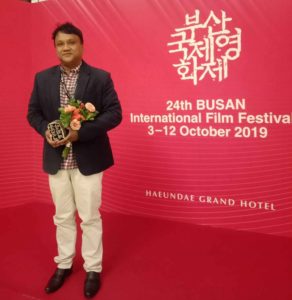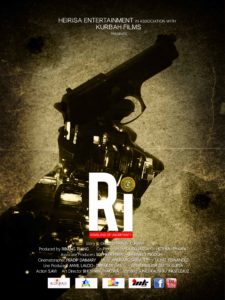 Pradip Kurbah is changing the film-scape of Meghalaya with “RI: Homeland of Uncertainty”, “Onaatah” and “Iewduh”. If his films have triggered discussions on the cinema from Northeast, he has put Meghalaya on the global movie map.
Pradip Kurbah is changing the film-scape of Meghalaya with “RI: Homeland of Uncertainty”, “Onaatah” and “Iewduh”. If his films have triggered discussions on the cinema from Northeast, he has put Meghalaya on the global movie map.
“Iewduh” is the first Indian film to win the Kim Ji-seok Award at the 24th Busan International Film Festival. Recently, it was acquired by Channel Four Television Corporation, UK and CM Pictures_Sales (South Korea).
Excerpts from an interview with Kurbah over “chai”
SS: Who is that one filmmaker who generated your interest in filmmaking?
PK: Although I follow many of them yet I don’t have a favourite. It’s more about their films. There is a director, for instance, who made 10 films but I liked only three of them. Then, there are directors who are not anyone’s favourite but they make that one film that is relatable. We come from a space where filmmakers say how they follow Andrei Tarkovsky and Bela Taar. But, what about those who haven’t heard of them? I came across both recently from fellow filmmaker and friend, Dominic Sangma. I started watching their films. I got to know about some filmmakers during my discourse with some students learning filmmaking.
SS: Tell us about your first film
PK: “Ka Mon Bajwat” was produced by my father Pomu Das in 1998. I was passionate about cinema and this film couldn’t have been possible without his vision and dream for Khasi cinema. His belief in me and confidence in the film made me who I am today. I remember we had an 8MM projector and that was the first time he showed me “Godfather”.

SS: Where did the inspiration for RI come from?
PK: Prior to the making of RI, I was supposed to be a part of an Assamese film with militancy in Assam as its backdrop. We had titled it Guwahati or Saraighat. But the producer backed out at the last minute. That was in 2004. I thought of making a film on the theme and focused on militancy here. I kept on writing and changing the script because the scenario was changing every year. I wish I could make it when militancy was at its height. A lot of things were happening which I couldn’t include in my script. In 2007, I met some people who were keen on producing the film. But nothing was happening on the ground. In 2011-12, the producers, who were part of this film, came aboard after listening to the story. By then, militancy too underwent a transformation. That is how the story of RI came about.
SS: As a storyteller, how do you approach different world-views with empathy?
PK: I meet a lot of people, friends and strangers. The different world views help me approach my characters from different angles. I brainstorm with my team. Listening helps. I love to observe people and listen to their conversations, even in public transport. Tea stalls, for instance, are an interesting space. Empathy is rooted in interaction.
SS: Your next film, “Onaatah” was so different thematically. What made you make a film on such a sensitive topic?
PK: The idea behind this film came at a time when incidents of rape were taking place here. I was following a few cases in the media. What I had realised was that we only get to know one side of the story and that is limited to the verdict. But, no one follows the story of survivors. I went to villages and lived there. I studied the locals and their lives. Initially, they were hesitant but gradually, they opened up and shared their stories. They asked me questions such as if they can fall in love again, get married, have a family and as to how the society will take it. The queries had contributed to the making of the film.
Eighty per cent of the people here were not happy with the climax of the film, for they failed to understand it. But that is life. If a rape survivor enters into a relationship, what is wrong in that? She needs time to understand life. That open ending was very important for me as a filmmaker.
SS: Your films are invariably steeped in realism. Is that a conscious decision?
PK: Yes, it is a conscious decision. I want to learn through experimentation. The backdrop varies but all my films deal with human stories. Cinema is not just about entertainment; it is also about reality. I am a realist.
SS: “Iewduh” was another movie not on the lines of audience’s expectations. What was that journey like?
PK: My parents had shops in a market. My father had a video library in Iewduh. He started everything from here. I have fond memories of the place. I wanted to make a film on this market but struggled to get the story for a long time. For about a year, I would go there, speak to people and listen to their stories over a cup of tea. I visited the public toilet and spoke to the guy manning it. That’s how my main character in “Iewduh” emerged. This is not a plot-driven film but a character-driven one. There are sub-plots but no main plot. “Iewduh” is a character in the film.
SS: How do you strike a balance between bouquet and brickbats?
PK: The balancing act is important and difficult. Look at the different film festivals. The success and failure of your film vary from festival to festival. It is important to know where your film will be screened. It is imperative that you share your experience with other filmmakers. When I send my film, I always tell my team not to have expectations. If we win, that’s good. If not, we have to move on. When “Iewduh” was nominated at Busan, we were happy. We didn’t expect it to win. The film has its flaws too. It didn’t work here or say, in Rotterdam. We have to come to terms with this reality. For me, it’s very important to find out the reasons behind failures.
SS: What are the challenges of filmmaking here?
PK: Funding is a huge issue. Luckily, my producer for “Iewduh”, Shankar LallGoenka, came on board. He understood the story I was trying to tell. We must not think too much about problems but find ways to wriggle out of them. Finding space for theatres is another problem. If people cannot come to a theatre, what do we do? If you ask me, I will say I will take it to them.
SS: What is your message to aspiring filmmakers?
PK: If you are passionate about cinema, follow your dream. Filmmaking is an interesting space to be in. Don’t let failures define your attitude. Be honest when you tell a story; it will show on the screen.



